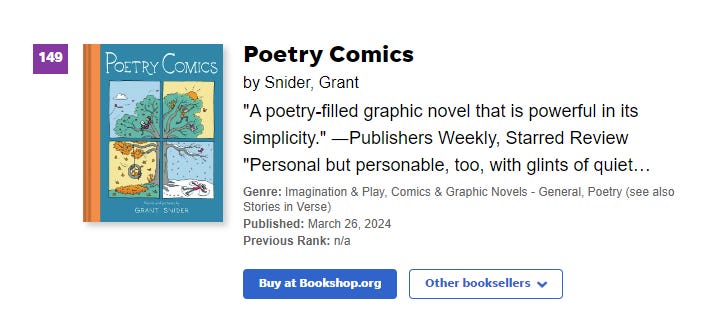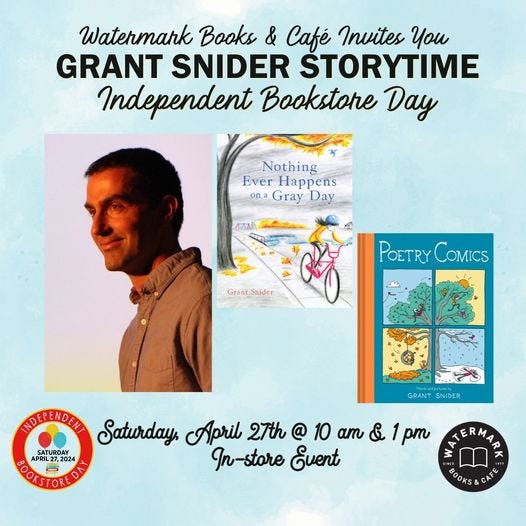Lustrous
One thing I’ve discovered in my four months of creating weekly Words of Wonder: often when I think I know what a word means, I look it up and realize I was wrong. My original word from an Emily Dickinson poem was lustral, which I assumed meant gleaming, luminous. Not so—the definition of lustral is “pure.”
Thankfully I found lustrous, a less pure but much shinier word. And the poem where I found the word features a major character in the Emily Dickinson poetic universe: the bumblebee.
My Rose by Emily Dickinson Pigmy seraphs gone astray, Velvet people from Vevay, Belles from some lost summer day, Bees' exclusive coterie. Paris could not lay the fold Belted down with emerald; Venice could not show a cheek Of a tint so lustrous meek. Never such an ambuscade As of brier and leaf displayed For my little damask maid. I had rather wear her grace Than an earl's distinguished face; I had rather dwell like her Than be Duke of Exeter Royalty enough for me To subdue the bumble-bee!
Here’s a bonus poetry comic for this week’s full moon, followed by a bonus Emily Dickinson poem.
From The Moon was but a Chin of Gold (737) by Emily Dickinson The Moon was but a Chin of Gold A Night or two ago – And now she turns Her perfect Face Upon the World below –
Caper
I tend to think of the word caper in criminal terms. A crime caper is a genre of fiction where a sly criminal engages in theft or other hijinks and outwits the bumbling good guys who pursue them. (The other time I think of caper is when I find one between the salmon and cream cheese on my bagel.)
But even the legal kind of capering often makes me feel guilty. Why should I allow myself to play when there’s stuff to get done? The Puritan inside me demands I stay at my desk working on a beautiful spring afternoon.
I do my best to ignore his disappointed glance. Lacing up a pair of grass-stained shoes, I run among the dandelions and henbit overgrowing my yard. Frolicking outdoors, like reading a memento mori poem by Emily Dickinson, is a vivid a reminder that I’m alive. No better time to enjoy it than now.
The Rose did caper on her cheek— (208)
by Emily Dickinson
The Rose did caper on her cheek—
Her Bodice rose and fell—
Her pretty speech—like drunken men—
Did stagger pitiful—
Her fingers fumbled at her work—
Her needle would not go—
What ailed so smart a little Maid—
It puzzled me to know—
Till opposite—I spied a cheek
That bore another Rose—
Just opposite—Another speech
That like the Drunkard goes—
A Vest that like her Bodice, danced—
To the immortal tune—
Till those two troubled—little Clocks
Ticked softly into one.
Adamantine
I recently heard this word in a podcast interview with author Katherine Rundell and host Tyler Cowen. My ears perked up at its mention. Here’s an excerpt from their conversation:
COWEN: You cut out the word “adamantine” from one of your books but kept the word “renunciation.” Why did you make that decision?
RUNDELL: Because “adamantine” was coming at a peak moment in the narrative. It was the key showdown between a child and a gangster figure, and I didn’t want anything that would slow children. But my general stance is, with children’s writing, you can use pretty much any vocabulary you want because they will either guess or step over or find out the word, and it rarely puts children off as much as we worry that it will.
Rundell writes eloquently about the joys of reading children’s literature as a grownup in her book WHY YOU SHOULD READ CHILDREN’S BOOKS, EVEN THOUGH YOU ARE SO OLD AND WISE.
I was delighted to find that Emily Dickinson wielded the word adamantine confidently—along with such fantastic words as “hasps” and “indolent.”
How many times these low feet staggered (238) by Emily Dickinson How many times these low feet staggered – Only the soldered mouth can tell Try – can you stir the awful rivet – Try – can you lift the hasps of steel! Stroke the cool forehead – hot so often – Lift – if you care – the listless hair – Handle the adamantine fingers Never a thimble – more – shall wear – Buzz the dull flies – on the chamber window – Brave – shines the sun through the freckled pane – Fearless – the cobweb swings from the ceiling – Indolent Housewife – in Daisies – lain!
Trackless
A blank page of poetry feels like an open field of fresh snow. Some days I’m reluctant to ruin its perfection with my crawlings. Other days I want to make the most elegant direct path to my destination: the end of the poem.
Some Arrows slay but whom they strike – (1565)
by Emily Dickinson
Some Arrows slay but whom they strike
But this slew all but him –
Who so appareled his Escape –
Too trackless for a Tomb –
Speaking of scrawlings: here’s a page from my used copy of SIX AMERICAN POETS (check out Jason McBride’s exultant tribute to this great book). I love the notations “the acceptance of one’s self without apology” and “her usual robin? = one’s soul.” Whoever owned this copy before me was a true reader.
PS— I bought the T-shirt.
In other news, POETRY COMICS made the USA Today bestseller list! Thanks to all you amazing readers for purchasing, reviewing, and recommending the book.
This weekend I’ll be reading and signing at Watermark Books & Café for Independent Bookstore Day. Go out and support your local bookshop!













I love all of these plus all of Emily D too! Bravo!🥇
Such a beautiful and creative tribute to Emily